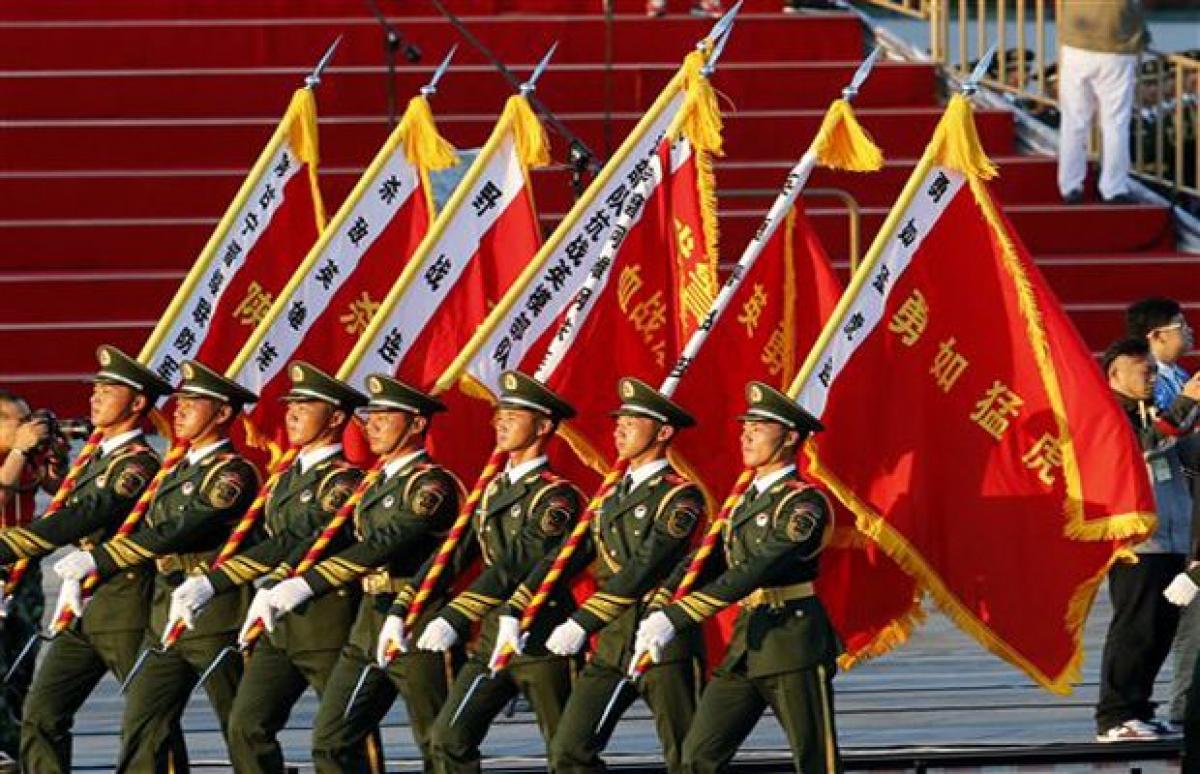Live
- Over 7,600 Syrians return from Turkiye in five days after Assad's downfall: minister
- Delhi BJP leaders stay overnight in 1,194 slum clusters
- Keerthy Suresh and Anthony Thattil Tie the Knot in a Christian Ceremony
- AAP, BJP making false promises to slum dwellers for votes: Delhi Congress
- 'Vere Level Office' Review: A Refreshing Take on Corporate Life with Humor and Heart
- Libya's oil company declares force majeure at key refinery following clashes
- Illegal Rohingyas: BJP seeks Assembly session to implement NRC in Delhi
- Philippines orders full evacuation amid possible volcanic re-eruption
- Government Prioritizes Welfare of the Poor, says Dola Sri Bala Veeranjaneyaswamy
- Two Russian oil tankers with 29 on board damaged due to bad weather
Just In

x
Highlights
China marks Japan WWII defeat, shows rising power in paradeTanks, missiles and troops in lock-step filed past Beijing\'s iconic Tiananmen Square in a massive parade Thursday commemorating Japan\'s World War II defeat 70 years ago and underlining President Xi Jinping\'s determination to make China the pre-eminent Asian power.
China marks Japan WWII defeat, shows rising power in paradeTanks, missiles and troops in lock-step filed past Beijing's iconic Tiananmen Square in a massive parade Thursday commemorating Japan's World War II defeat 70 years ago and underlining President Xi Jinping's determination to make China the pre-eminent Asian power.
To underline China's position that its rise is peaceful and poses no threat to neighbors, Xi pledged to cut 300,000 troops from the 2.3 million strong People's Liberation Army, the world's largest standing military. Helicopters zoomed overhead in an array forming the number 70.
.jpg)
Soldiers of China's People Liberation Army (PLA) prepare in front of Tiananmen Gate ahead of a military parade to commemorate the 70th anniversary of the end of World War II in Beijing (Photo:AP)
Xi kicked off the proceedings with a speech at the iconic Tiananmen Gate in the heart of Beijing, flanked by Chinese leaders and foreign dignitaries, including Russian leader Vladimir Putin, South Korean President Park Geun-hye and U.N. Secretary General Ban Ki-moon.
"The experience of war makes people value peace even more," Xi said. "Regardless of the progress of events, China will never seek hegemony, China will never seek to expand and will never inflict the tragedies it suffered in the past upon others."
Xi then drove past the assembled troops in a Chinese-made Red Flag limousine, standing up through a sunroof with four microphones mounted in front of him, calling out "Greetings, Comrades" every few moments, before the troops started their marching.
The spectacle involved more than 12,000 troops, 500 pieces of military hardware and 200 aircraft of various types, representing what military officials say is the Chinese military's most cutting-edge technology.
The parade is part of commemorations packaged to bolster the ruling Communist Party's self-declared role as the driving force behind Japan's defeat 70 years ago and savior of the nation, though historians say the rival Nationalists did most of the fighting. The events also minimize the role of the U.S., Britain and others.
Most leading democracies kept high-level representatives away, reflecting concerns over the parade's anti-Japanese tone and China's recent aggressive moves to assert territorial claims. The U.S. sent only its ambassador to observe. In Washington, U.S. Defense Department spokesman Bill Urban said that the U.S. maintains such commemorations should be about reconciliation and that a "large military display would not appear to be consistent with this theme."
Under Xi, who took power as party leader in late 2012, Beijing has sent ships to confront Japan's coast guard near disputed islands in the East China Sea, blockaded Philippine island outposts and constructed whole islands from reefs, topping them with airstrips and other military infrastructure.
China usually holds lavish military parades only every 10 years to mark the anniversary of the founding of the communist People's Republic in 1949. By holding an additional one now, Xi ensures that he'll preside over at least two of the prestigious events during his decade-long tenure in power ending in 2023.
The parade panders to a prickly strain of nationalism in a Chinese public constantly reminded by state propaganda of China's past humiliations at the hands of foreign powers, especially Japan, which is widely despised for its perceived failure to properly atone for invading China.
While a hit at home, such sentiments heighten fears abroad about China's intended uses of its newfound power, frustrating Beijing's attempts to market itself as a responsible member of international society committed to the common good.
"In domestic terms, it's certainly a plus for Xi. But in foreign policy terms, it's controversial. It doesn't enhance China's soft power. It doesn't help China's image as a force for peace, stability and development," said Joseph Cheng, a retired academic and political analyst in Hong Kong.

Next Story
More Stories
ADVERTISEMENT
© 2024 Hyderabad Media House Limited/The Hans India. All rights reserved. Powered by hocalwire.com







